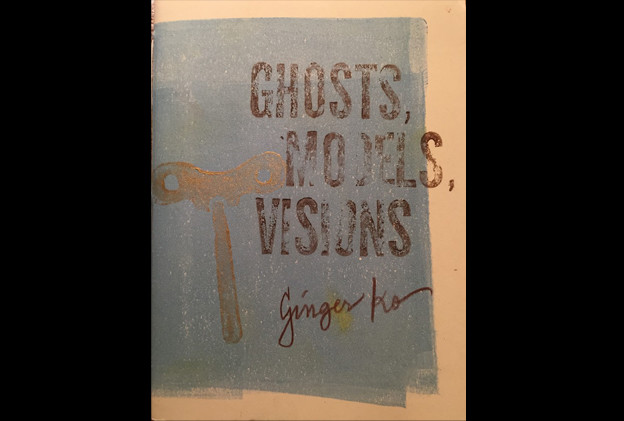On Ginger Ko's 'Ghosts, Models, Visions' (2017)

The speakers in Ginger Ko’s chapbook Ghosts, Models, Visions contemplate the peculiarities of living in the present and a near-future populated by post-human automatons, strangely evolved mammals, and the unborn. All of these entities have a voice in this collection, along with seemingly regular human beings, and all are subject to the numbing effects of late capitalism, enacting labor that divorces the mind from the body and the self from its selves, and straining under unyielding debt in spite of constant effort, as in this excerpt from “They Have Stopped Moving”:
They have gathered
the information
of the world
and they cannot
predict continuance
from the data. Will
my representative
build other
representatives
of color? Will
my automaton
return the world
to itself? How
do I decide
whether it is
important that I
run my fingernail
down my thigh,
to watch the little
trail of white
before my brownness
fills back in? I
am grateful
to be born
so far along.
I am buying
myself a future,
a material outlook.
As in this poem, the speakers tend to espouse a matter-of-fact, deadpan tone, while asking profound and odd questions about their circumstances in a pre- or post-Singularity world. Here, a human speaker seems to consider whether their mechanical analog will restore the world after the human beings have annihilated themselves, and expresses a desire for continuance in spite of dire predictions. Rather than embracing the fantasy of a postracial future, Ko envisions race, gender, and human cruelty as persistent societal shapers, even as our bodies morph and dissolve in the acid baths of mental work and technological upheaval. In “The Rotted Water of My Urbanity,” the speaker dryly observes:
When
your own body
is meaningless, when
you sit at home
on soft furniture
because your
automaton sits
at work every hour
of the day, suddenly
you begin to love
all the bodies.
The automaton may be a metaphor for dissociation of body from mind that occurs when one is engaged in too much white-collar work, or it may the type of person who enacts labor in the present and in the not-so-distant future. In any case, neither human beings, nor automatons, nor ghosts, nor post-humans fare very well in this dystopian world spiked with images of industrial feed lots and the telegraphic utterances of the unborn, although intriguingly again, all retain the ability to speak and think, keenly bearing witness to the dynamics of their world and ours, as in these lines from “We Can Only Shine Where There Is Light”:
All of us
who survived
by letting others
tell, providing inquiry
for others’ pleasure
in providing answers,
we lasted the longest,
pressing buttons,
typing input.
Tweens: Asian American Poetry & Poetics in the 2010s